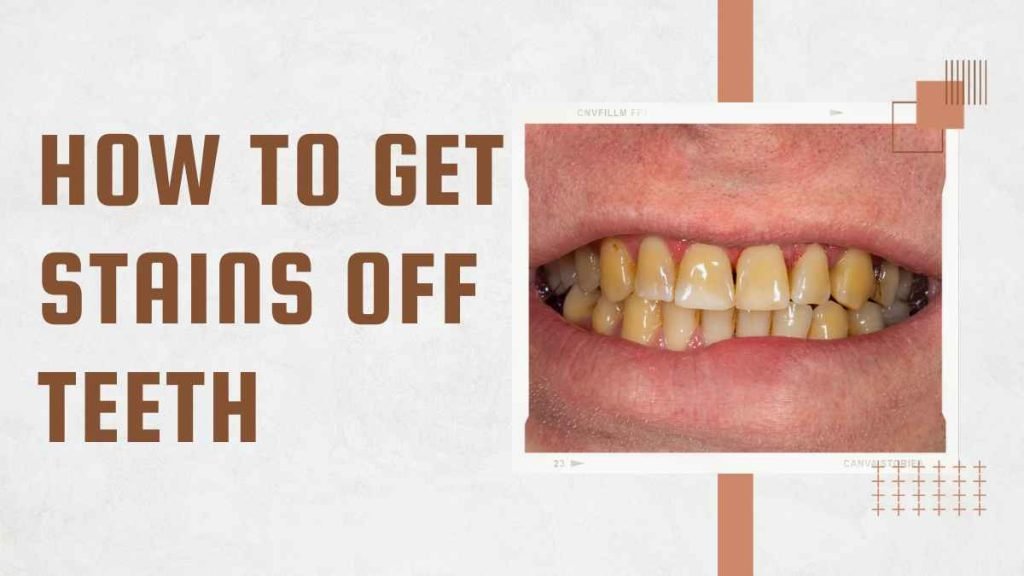How to Get Stains Off Teeth! We all desire a bright, confident smile, but tooth stains can often dim our pearly whites. Fear not! In this comprehensive guide, we will explore How to Get Stains Off Teeth. Here we’ll walk you through the ins and outs of tooth staining and provide you with a step-by-step guide on how to regain that sparkling smile you crave.
Table of Contents
Introduction
Let’s face it – stained teeth can be a real confidence crusher. Whether it’s that morning coffee or a love for red wine, our teeth often bear the brunt of our indulgences. However, there’s no need to fret. With the right knowledge and techniques, you can bid farewell to those stubborn stains and greet the world with a beaming, stain-free grin.
What Is Tooth Staining?
Before we delve into the solutions, it’s essential to understand what causes tooth staining. Tooth staining occurs when pigmented compounds called chromogens latch onto the porous enamel of our teeth. These compounds can be found in various foods and beverages, such as coffee, tea, and berries, as well as tobacco products.

How to Get Stains Off Teeth: A Step-by-Step Guide
Here you can check the step-by-step guide about How to Get Stains Off Teeth:
Total Time: 6 minutes
Good Old Brushing and Flossing
The foundation of any good oral hygiene routine begins with regular brushing and flossing. Use a quality toothpaste with whitening properties and a soft-bristled brush to gently scrub away surface stains. Don’t forget to floss – it reaches those tricky spots between teeth where stains love to hide.
Professional Dental Cleanings
Regular dental cleanings are your best bet against stubborn stains. Dentists use specialized tools to remove plaque and tartar buildup, ensuring your teeth are squeaky clean. Professional cleanings can also include polishing, which effectively removes surface stains.
Whitening Toothpaste and Mouthwash
Invest in a whitening toothpaste or mouthwash containing mild abrasives and polishing agents. These products help remove stains while maintaining your oral health. Use them as directed for the best results.
Home Whitening Kits
Over-the-counter home whitening kits, like whitening strips or gels, can be effective for mild to moderate stains. Follow the instructions carefully, and you’ll notice gradual improvements in the color of your teeth.
Natural Remedies
Certain natural remedies, such as baking soda and hydrogen peroxide, can act as gentle abrasives to lift surface stains. However, consult your dentist before trying any home remedies to ensure they won’t harm your teeth.
What Causes Stains on Teeth?
Understanding the root causes of tooth staining can help you make informed choices about your diet and lifestyle. Some common culprits include:
- Foods and Beverages: Dark-colored foods and drinks like coffee, tea, red wine, and berries contain chromogens that stain teeth.
- Tobacco Use: Both smoking and chewing tobacco can lead to stubborn, hard-to-remove stains.
- Poor Dental Hygiene: Inadequate brushing and flossing allow plaque and stains to accumulate.
- Aging: As we age, tooth enamel naturally wears down, making teeth more susceptible to staining.
- Medications: Certain medications, such as tetracycline antibiotics, can cause intrinsic stains, which are deep stains within the tooth.
Types of Teeth Stain
- Extrinsic Stains: These stains occur on the surface of the enamel and are caused by external factors like food, drinks, and smoking. They can often be removed with regular dental cleanings and good oral hygiene practices.
- Intrinsic Stains: Intrinsic stains develop inside the tooth and are usually caused by factors during tooth development or trauma. Intrinsic stains can be more challenging to remove and may require professional dental treatments.
Some Other Methods to Get Stains Off Teeth
Dental Bonding
Dental bonding involves applying a tooth-colored resin to the stained tooth and then hardening it with a special light. This procedure can effectively cover stains and improve the tooth’s appearance.
Dental Veneers
Veneers are thin, custom-made shells that cover the front surface of teeth. They are an excellent option for masking severe stains and can provide you with a bright, uniform smile.
Professional Teeth Whitening
In-office teeth whitening procedures performed by dentists use powerful bleaching agents and specialized equipment to whiten teeth significantly. This method delivers quick and noticeable results.
Benefits of Getting Stains Off Teeth
Improved Confidence: A bright, stain-free smile can boost your confidence and self-esteem, making you more comfortable in social and professional settings.
Better Oral Health: Removing stains often involves thorough cleaning, which contributes to better oral hygiene. Healthy teeth and gums are the foundation of a beautiful smile.
Enhanced Appearance: A whiter smile can take years off your appearance, making you look more youthful and vibrant.
Common Mistakes to Avoid
- Overusing Whitening Products: Excessive use of whitening products can damage tooth enamel and gums. Follow the instructions and consult your dentist if you have concerns.
- Ignoring Professional Help: Stubborn stains may require professional intervention. Don’t hesitate to seek help from your dentist for personalized solutions.
- Neglecting Oral Hygiene: Good oral hygiene practices are crucial in preventing new stains from forming. Brush, floss, and visit your dentist regularly.
Tips and Tricks for Maintaining a Stain-Free Smile
- Rinse After Consumption: If you indulge in stain-causing foods or beverages, rinse your mouth with water afterward to minimize their impact.
- Use a Straw: When drinking beverages prone to staining, using a straw can reduce direct contact with your teeth.
- Chew Sugar-Free Gum: Chewing sugar-free gum stimulates saliva production, which naturally cleanses your mouth and helps prevent stains.
Facts About Tooth Staining
- Tooth enamel is porous: This means it can absorb stains from various sources, leading to discoloration over time.
- Regular dental cleanings matter: Professional cleanings not only remove stains but also help in the early detection of dental issues, ensuring a healthier smile.
Conclusion
In conclusion of How to Get Stains Off Teeth, achieving a stain-free smile is not just about aesthetics; it’s about maintaining good oral health and boosting your confidence. By understanding the causes of tooth staining and adopting the right techniques, you can reclaim the natural whiteness of your teeth. Remember, a radiant smile is within your reach – take the necessary steps, consult your dentist when needed, and greet the world with your dazzling, stain-free grin! Here you can checkout that How to Floss Back Teeth.
FAQs About How to Get Stains Off Teeth
Can I prevent tooth staining completely?
Yes, you can minimize staining by practicing good oral hygiene, avoiding tobacco, and moderating your consumption of stain-causing foods and drinks.
Are natural remedies like activated charcoal effective for teeth whitening?
While some natural remedies show promise, it’s best to consult your dentist before trying them. Activated charcoal, for instance, can be abrasive and may damage enamel if used excessively.
How often should I have professional dental cleanings?
Most dentists recommend having a dental cleaning every six months. However, your dentist may suggest more frequent cleanings if you’re prone to stains or have specific dental concerns.
Can teeth staining be a sign of an underlying health issue?
In some cases, yes. Staining can be a symptom of certain medical conditions or medications. If you notice sudden or severe staining, consult your dentist to rule out underlying health problems.
Will teeth whitening make my teeth sensitive?
Some people may experience temporary sensitivity after teeth whitening. Using toothpaste designed for sensitive teeth and avoiding extremely hot or cold foods can help alleviate discomfort.
Are DIY teeth whitening kits safe?
When used as directed, most over-the-counter whitening kits are safe. However, consulting your dentist before using any products is essential to ensure they are suitable for your teeth and gums.
How long do the results of professional teeth whitening last?
The duration of whitening results varies from person to person. Avoiding stain-causing substances and maintaining good oral hygiene can help prolong the effects. Regular touch-ups may be needed to maintain a bright smile.


